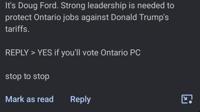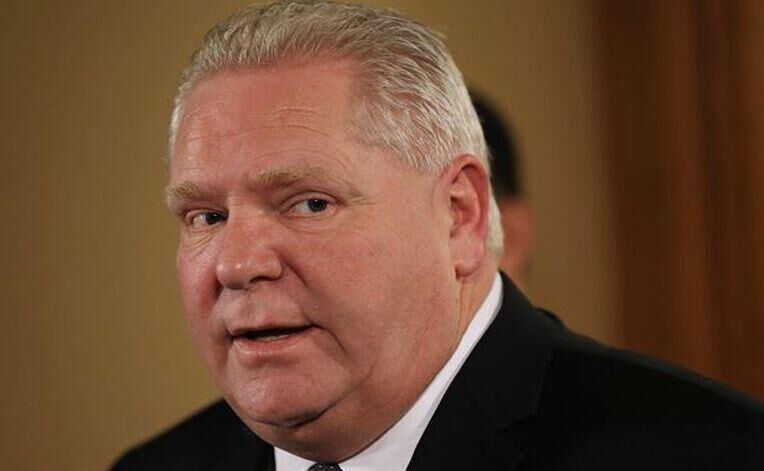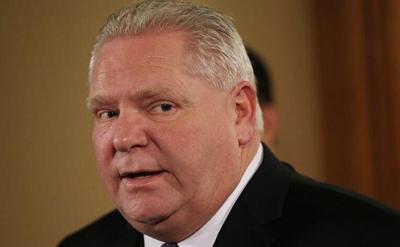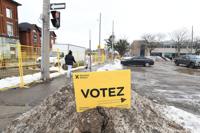Have you received unsolicited text messages from candidates running in the Feb. 27 provincial election?
Youâre not alone.
Political parties use text messaging to help make guesses about who is likely to support them at the polls, noted Peter Graefe, associate professor of political science at McMaster University.
âItâs a very effective technique because it doesnât cost much,â Graefe said.
If you respond with a simple yes or no, or you choose to write something more colourful, your response is valuable to the party, Graefe added.


A Reddit user provided a screenshot of a text message gauging support for Progressive Conservative Leader Doug Ford. The provincial election is Feb. 27.
ThisIsntAThrowaway29 screenshotOntarians have reported receiving recent text messages from Ontario PC Leader and incumbent premier Doug Ford.
The Ontario PC Party has also confirmed it sends text messages, but has not indicated how it accesses Ontario residentsâ cellphone numbers.
Thatâs raised privacy concerns for some voters.
‘This is an invasion of my privacy’
reader Marie Webb told us: âI was shocked and annoyed on receiving a text message from Doug Ford. I choose who I want to give my cell number to. This is an invasion of my privacy. Use the landline where I can choose to answer or not.â
Reader Yvette Nugent questioned why the PC government can send texts, but wonât use an electronic method, like direct deposit, to issue $200 taxpayer rebates.
âIt would’ve been more cost efficient if the government would have done the direct deposit,â Nugent said in an email to Metroland.
Readers have also told us they have received unsolicited texts from other political parties.
What Ontario’s Information and Privacy Commissioner says
While itâs not always clear how political parties and candidates access cellphone data, we asked Ontarioâs information and privacy commissioner (IPC), to weigh in on the issue.
The IPC serves as the provinceâs transparency watchdog and provides oversight for access and privacy laws which apply to provincial and municipal public institutions such as ministries, municipalities, colleges, hospitals and child and family service providers.
But the IPC confirmed in a statement to Metroland that political parties and candidates are not subject to Ontarioâs access and privacy laws.
âRegulations related to political advertising are overseen by , which oversees the , and the ,â the IPCâs statement notes. âIf third-party vendors sell personal data, including telephone numbers, to political parties in Ontario, those vendors may be subject to federal privacy laws overseen by the Office of the Privacy Commissioner of Canada.
âUnsolicited commercial electronic messages, such as spam, are subject to federal anti-spam legislation which is enforced by the Canadian Radio-television and Telecommunications Commission.â
Future laws should include political parties
The IPC’s office noted it has previously recommended any future private sector privacy laws in Ontario include political parties.
âAdvances in technology allow for the collection and use of large amounts of personal information, raising privacy and security concerns,â the IPCâs statement added. âEnsuring strong privacy protections supports public confidence in how personal information is handled.â
Do-not-call list exemptions
The (CRTC) notes that regardless of whether Canadians are registered with the National Do Not Call List, residents may still receive calls and texts from political parties and candidates.
Parties and candidates are exempt from the do-not-call list, but some rules still apply.
Parties and candidates can contact people on the list, provided they maintain and respect their internal do-not-call list and identify themselves and the purpose of the call.
If you reply âstopâ to political campaign text messages, you should not receive further communication, according to the intent of the CRTC rules.
How to lodge a complaint
If youâve received a misleading call, text or email about the election, .
While parties and candidates are exempt from the do-not-call rules, they are not exempt from telemarketing and automatic dialing-announcing device rules, the CRTC notes.
Error! Sorry, there was an error processing your request.
There was a problem with the recaptcha. Please try again.
You may unsubscribe at any time. By signing up, you agree to our and . This site is protected by reCAPTCHA and the Google and apply.
Want more of the latest from us? Sign up for more at our newsletter page.























To join the conversation set a first and last name in your user profile.
Sign in or register for free to join the Conversation